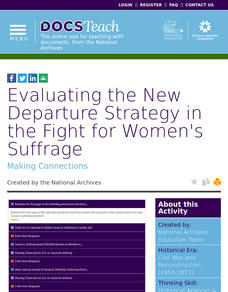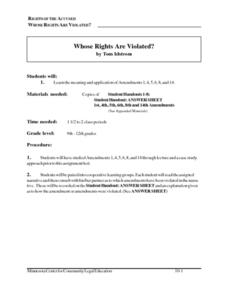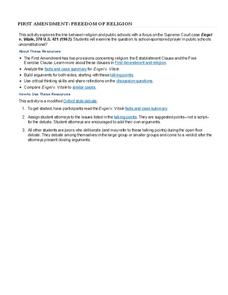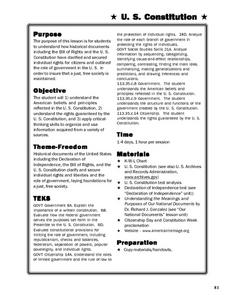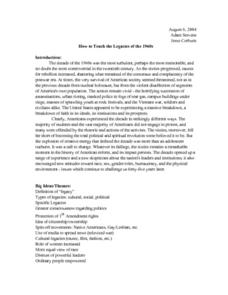Bill of Rights Institute
Freedom for All?
What did abolitionists have in common with those working for women's rights? How has the Native American struggle for voting rights differed from the struggles of other groups? Class members examine the 15th, 19th, 23rd, 24th, and 26th...
Carolina K-12
Marsh v. Chambers and the Establishment Clause
1983 Supreme Court case Marsh v. Chambers, which centers on whether opening a legislative session with a prayer violates the Establishment Clause in the First Amendment to the US Constitution, is the focus of a series of discussions and...
National Woman's History Museum
Women's Suffrage Movement
The National Women's History Museum offers a 20-slide presentation that details the history of the Women's Suffrage Movement from its creation in the 1830s through the passage of the Nineteenth Amendment in 1920.
Center for History Education
Nineteenth Century Reform Movements: Women's Rights
It's hard to imagine a world where women were marginalized from the seats of power. Yet, there are women today who remember what it was like to not be allowed to vote. Using a DBQ of images and other primary sources, such as political...
Curated OER
The Nineteenth Amendment: Susan B. Anthony
What would your scholars do if Susan B. Anthony walked into class? Shock them to attention with this instructional activity, which has the school secretary (or any willing participant) dress as the famous suffragette and answer questions...
Facing History and Ourselves
Interracial Democracy
Radical Reconstruction, the 10-year period referred to after Congress passed the Reconstruction Act of 1867, saw the establishment of manhood suffrage, men voting without any racial qualifications. Southern states also rewrote their...
DocsTeach
Evaluating the New Departure Strategy in the Fight for Women's Suffrage
When women demanded their right to vote, did the Constitution already protect it? The New Departure Strategy in the women's suffrage movement made this claim through court hearings. Using documents, such as transcripts from Susan B....
DocsTeach
Election of 1800
The 2020 election is not the only unpredictable one in history. The Election of 1800 highlighted an unforeseen event in a presidential election. The activity reviews documents from the elections and what happened when the electoral...
Center for History Education
Speaking Freely In the Soviet Union's Autocratic Government
Speak your mind! The lesson explores the difference in free speech between the United States and the Soviet Union. Academics review the constitutions of both governments, political cartoons, and case studies to understand how freedom of...
Curated OER
Citizenship Test: Principles of American Democracy, Questions 1-12
Prepare your English learners for their upcoming citizenship test with this presentation. Addressing common questions about the American government and Constitution, this slideshow could be a good study guide for students who struggle...
Curated OER
Whose Rights Are Violated?
High schoolers examine the 1st, 4th, 5th, 6th, 8th and 14th Amendments to the Constitution. They work with a partner to determine which amendment has been violated while working on a worksheet.
Administrative Office of the US Courts
Engel v. Vitale
"Is school-sponsored prayer in public schools unconstitutional?" That is the question teams debate as they consider the arguments presented to the Supreme Court in Engel v. Vitale. The attorneys study the provided talking points and...
Curated OER
To Vote or Not to Vote? that is the Question!
Young scholars examine voting rights provided by the United States Constitution. In this voting lesson plan, students focus on 3 amendments that extended voting rights to all citizens. Young scholars discuss the importance of expressing...
Curated OER
Constitutional Rights
Students read an account of a students reaction to the Vietnam War. They complete comprehension questions from the reading passage. They read arguments from the Supreme Court Justices and decide which arguments they agree with.
Heritage Foundation
The Senate
Do your learners struggle to understand the differences between the Senate and the House of Representatives? Help them develop an understanding of how the US Constitution's clauses affect the Senate's operations. A high-quality social...
Bill of Rights Institute
Preserving the Bill of Rights
Consider how America's founding fathers and their experiences contributed to the rights we all enjoy today. A collection of reading, writing, and collaborative exercises prompt high schoolers to think about the ways their current lives...
Curated OER
The First Amendment
Students participate in a mock trial. Given the scenario, students prepare a cases concerning the freedom of religion, freedom of speech, and the right to assemble. In groups, students prepare an opening and closing statement, as well...
Curated OER
Using Primary Sources to Discover Reconstruction
Fifth graders discover how reconstruction had an impact on racial issues in the United States. In this Reconstruction lesson, 5th graders are introduced to primary vs. secondary resources and then rotate through stations to view...
Curated OER
Recommended Reading?
Students examine and defend various positions in the argument over a book ban in the Miami-Dade school system and then write a letter to the Miami-Dade school board expressing their opinion about the issues raised in the debate.
Curated OER
How to Teach the Legacies of the 1960s
Students consider which aspects of world around them have roots in 1960s, research and compare 1960s to today with regards to Civil and Women's Rights, Vietnam, counterculture, music, voting, and economic rights, and explore legacy of...
Curated OER
The Taliban Meets the Bill of Rights
Students contrast the Taliban and the Constitution. They read through "What the Taliban Banned" and identify "rights." They determine if rights in the United States are in danger and if the Taliban violate the first ten amendments to...
State Bar of Texas
Gideon v. Wainwright
How does a trial begin without a lawyer for the defendant? The 1963 Supreme Court case Gideon v. Wainwright serves as the backdrop for the study of the rights of the accused. Scholars use a short video along with paired discussion and...
K12 Reader
Responsibilities of Citizenship
Your pupils are all citizens of your classroom. Provide some more instruction on how people can be citizens with the reading passage included here. After reading, learners answer the five related questions.
Curated OER
Cartoons for the Classroom: Why is Freedom of Speech a Burning Issue?
In this current events worksheet, students analyze a political cartoon about the freedom of speech and respond to three short answer questions








